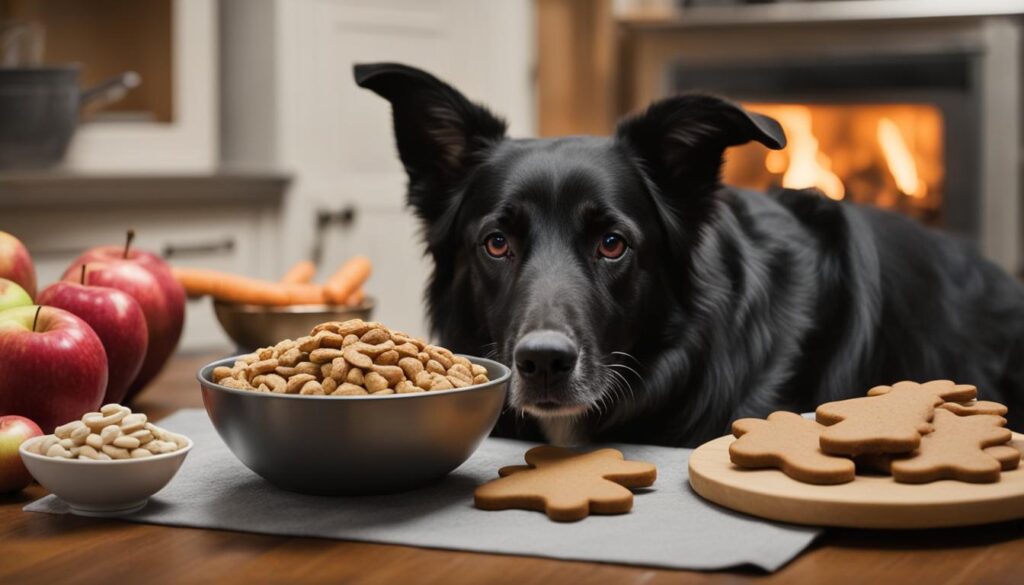Gingerbread is a delicious treat that many people enjoy during the holiday season. However, when it comes to our furry friends, we need to be cautious about what they consume. Can dogs eat gingerbread? The short answer is no. While it may be tempting to share a piece of gingerbread with your canine companion, it can actually be harmful to their health.
Gingerbread contains several ingredients that can be toxic to dogs. One of the main culprits is nutmeg, which is often used in gingerbread recipes. Nutmeg can cause serious health issues for dogs, including hallucinations, seizures, and even fatality when ingested in large amounts. Gingerbread also typically contains sugar, butter, and other ingredients that can be harmful to dogs. These ingredients can lead to problems such as weight gain, diabetes, digestive upset, and pancreatitis.
It is important to prioritize your dog’s health and choose safer alternatives for them to enjoy during the holiday season. There are plenty of dog-friendly treats available that are specifically made with ingredients that are safe for dogs. By opting for these alternatives, you can ensure that your furry friend can still indulge in tasty treats without compromising their well-being.
Key Takeaways:
- Gingerbread is not safe for dogs to eat due to its harmful ingredients.
- Nutmeg, a common ingredient in gingerbread, is toxic to dogs and can cause serious health issues.
- Sugar, butter, and other ingredients in gingerbread can lead to weight gain, diabetes, and digestive upset in dogs.
- Choose safer alternatives that are specifically made for dogs to ensure their well-being.
- Consult with your veterinarian for personalized recommendations and guidance.
Why is Gingerbread Bad for Dogs?

Gingerbread poses risks to dogs’ health due to its harmful ingredients and potential toxicity. Let’s explore why gingerbread is not safe for our furry friends:
- Gingerbread Toxicity: Gingerbread often contains nutmeg, which is toxic to dogs. Ingesting large amounts of nutmeg can lead to severe symptoms such as hallucinations, seizures, and even fatality.
- Sugar Content: Gingerbread typically includes sugar, which can cause weight gain and increase the risk of diabetes in dogs. Excessive sugar consumption can lead to various health issues, such as obesity and heart disease.
- Butter and Digestive Upset: Butter, a common ingredient in gingerbread, can cause digestive upset and pancreatitis in dogs. These conditions can result in vomiting, diarrhea, and abdominal pain.
Considering these factors, it is crucial to refrain from giving gingerbread to dogs to protect their well-being.
Can Dogs Eat Gingerbread Cookies?

Gingerbread cookies are not safe for dogs to eat. They contain harmful ingredients such as nutmeg, sugar, and butter, which can be detrimental to your dog’s health.
Even a small amount of gingerbread cookies can cause digestive issues in dogs, including vomiting and diarrhea. These cookies may also lead to other health problems, such as pancreatitis and weight gain.
It is important to prioritize your dog’s well-being and avoid giving them gingerbread cookies. Instead, opt for safer treats that are specifically made for dogs. There are plenty of dog-friendly treats available that are both delicious and safe for your furry friend to enjoy.
To ensure your dog’s safety and happiness during the holiday season, consider giving them homemade dog treats or commercially available treats that are free from harmful ingredients. By choosing these alternatives, you can provide your dog with a tasty and healthy treat without the risks associated with gingerbread cookies.
Remember, always consult with your veterinarian regarding your dog’s dietary needs and any concerns you may have about their food choices. Your veterinarian can provide personalized recommendations and ensure that your dog’s treats align with their overall health and well-being.
What To Do if Your Dog Ate Gingerbread

If your dog accidentally eats gingerbread, it is essential to monitor their symptoms and take appropriate action. The risk of harm depends on the amount of gingerbread consumed, with smaller dogs being more susceptible to adverse effects.
If your dog shows signs of vomiting, diarrhea, lethargy, trembling, seizures, or changes in behavior after eating gingerbread, it is recommended to contact your veterinarian. They can advise on whether immediate medical attention is necessary.
In cases of significant ingestion or severe symptoms such as disorientation, hallucinations, increased heart rate, or blood pressure, it is important to call the Pet Poison Helpline at [phone number] and visit the nearest veterinary emergency clinic.
Remember, early intervention is key to ensuring your dog’s health and well-being. Don’t hesitate to seek professional help if your dog has consumed gingerbread.
| Symptoms | Action |
|---|---|
| Vomiting, diarrhea, lethargy | Contact your veterinarian |
| Trembling, seizures, changes in behavior | Contact your veterinarian |
| Disorientation, hallucinations, increased heart rate, high blood pressure | Call Pet Poison Helpline, visit veterinary emergency clinic |
What To Feed Your Dog Instead of Gingerbread

Instead of giving dogs gingerbread, there are plenty of safer and healthier alternatives they can enjoy during the holiday season. Here are some dog-friendly holiday treats that will keep your furry friend happy and satisfied:
- Gingerbread Icebox Cookies: Bake delicious homemade holiday dog treats using dog-safe ingredients. These gingerbread-inspired cookies are a great alternative and can be tailored to suit your dog’s taste preferences.
- Pet-Safe Holiday Cookie Recipes: Find pet-friendly recipes that are specifically formulated to cater to your dog’s dietary needs. You can create festive cookies using ingredients that are safe for your canine companion.
- Holiday Snowball Treats: Make adorable snowball-shaped treats that are both delicious and safe for dogs. These bite-sized delights will surely bring some extra joy to your pet during the holiday season.
Additionally, you can explore commercial dog treats that are specifically made for dogs and free from harmful ingredients. These treats are often designed with their well-being in mind, ensuring they receive safe and enjoyable snacks. Remember to consult with your veterinarian about any concerns or dietary restrictions your dog may have to ensure they are receiving appropriate and safe treats.
By opting for these gingerbread alternatives, you can ensure that your furry friend gets to partake in the holiday festivities without compromising their health and well-being.
Gingerbread Safety Myths Debunked

There are several myths circulating regarding the safety of gingerbread for dogs that need to be debunked. Some dog owners may believe that ginger is safe for dogs and assume that gingerbread is also safe. However, this assumption is incorrect and can lead to potential health risks for our furry friends. Let’s clarify some of these common misconceptions:
-
Myth 1: Ginger is safe for dogs, so gingerbread must be safe too.
While ginger itself can offer certain health benefits for dogs, the same cannot be said for gingerbread. Gingerbread contains other ingredients such as nutmeg, sugar, and butter that can be harmful to dogs. It is important to understand that not all ginger-based products are safe for canine consumption.
-
Myth 2: Dogs can handle small amounts of gingerbread without any issues.
Even small amounts of gingerbread can cause adverse effects in dogs. The toxic nature of nutmeg, along with the high sugar and fat content in gingerbread, can lead to serious health problems for dogs. It is best to avoid giving gingerbread to dogs altogether.
-
Myth 3: Dogs can digest gingerbread just like humans can.
While dogs may be able to tolerate certain human foods in small quantities, gingerbread is not one of them. Dogs have different digestive systems than humans, and certain ingredients in gingerbread can cause digestive upset, pancreatitis, and other health issues in dogs. It is essential to prioritize your dog’s digestive health by avoiding gingerbread entirely.
It is crucial to always prioritize your dog’s well-being and choose safer alternatives that are specifically made for them. Let’s explore some of these alternatives in the next section.
Allergic Reactions and Other Risks of Gingerbread for Dogs

Feeding gingerbread to dogs can lead to various allergic reactions and other risks. Dogs may experience digestive issues such as vomiting, diarrhea, and stomach discomfort due to the spices and ingredients like cinnamon and nutmeg found in gingerbread. Some dogs may develop itching, redness, rashes, or excessive scratching as a result of allergies to ingredients like wheat or eggs commonly found in gingerbread. Severe cases can even lead to respiratory distress, including difficulty breathing, wheezing, or coughing. It is crucial to avoid feeding dogs gingerbread and be aware of the potential risks to their health.
| Risks of Gingerbread for Dogs | Allergic Reactions | Digestive Issues | Respiratory Distress |
|---|---|---|---|
| Causes itching, redness, rashes, and excessive scratching | Leads to vomiting, diarrhea, and stomach discomfort | Can result in difficulty breathing, wheezing, or coughing | |
| Due to wheat or egg allergies | Spices and ingredients like cinnamon and nutmeg |
The Dangers of Gingerbread’s High Sugar Content for Dogs
Gingerbread may be loved by humans during the holiday season, but it poses significant dangers to dogs due to its high sugar content. Consuming excessive amounts of sugar can lead to a range of health issues for our furry friends.
One of the primary concerns is obesity. Just like humans, dogs can gain weight from consuming too much sugar. Obesity in dogs can lead to a myriad of health problems, including heart disease, joint issues, and a decreased lifespan.
In addition to weight gain, the high sugar content in gingerbread can also contribute to dental problems in dogs. Sugar promotes the growth of harmful bacteria in the mouth, leading to plaque buildup, gum disease, and tooth decay. Regular consumption of gingerbread can accelerate the onset of these dental issues.
Furthermore, excessive sugar intake can increase the risk of diabetes in dogs. Dogs that consume sugary treats like gingerbread are more likely to develop insulin resistance and high blood sugar levels, which can progress to diabetes over time. Diabetes requires lifelong management and can have serious consequences for a dog’s overall health and well-being.
Another concern is the impact of gingerbread’s high sugar content on the digestive system of dogs. Dogs are not designed to handle large amounts of sugar, and an overload can cause gastrointestinal problems such as diarrhea and stomach upset. Additionally, excessive sugar intake can increase the risk of pancreatitis, an inflammation of the pancreas that can be painful and potentially life-threatening for dogs.
To ensure the health and well-being of your furry companion, it is crucial to be mindful of the high sugar levels in gingerbread and opt for treats with low sugar content or specially made dog treats that prioritize their health. When treating your dog during the holiday season, consider homemade treats using dog-friendly ingredients or commercially available treats specifically formulated for canine consumption.
Remember, hydration is also essential for dogs to maintain optimal health. Providing fresh water at all times can help flush out toxins, aid in digestion, and keep your dog’s overall well-being in check.
| Sugar-related risks for dogs: | Consequences: |
|---|---|
| Obesity | Weight gain, heart disease, joint problems, decreased lifespan |
| Dental problems | Plaque buildup, gum disease, tooth decay |
| Diabetes | Insulin resistance, high blood sugar levels, lifelong management |
| Gastrointestinal issues | Diarrhea, stomach upset, increased risk of pancreatitis |
Expert Quote:
“The high sugar content in gingerbread is a major concern for dog health. It can contribute to obesity, dental problems, diabetes, and gastrointestinal issues. It’s important for pet owners to be mindful of the risks and choose healthier alternatives for their furry friends.” – Dr. Emily Johnson, DVM
Wrapping Up
In conclusion, it is crucial to prioritize your dog’s health and well-being when it comes to feeding them gingerbread. Due to the presence of harmful ingredients such as nutmeg, sugar, and butter, gingerbread can pose serious risks to dogs, including symptoms like hallucinations, seizures, digestive issues, weight gain, and even diabetes or pancreatitis. Therefore, it is recommended to avoid feeding gingerbread to your furry friend.
Instead, consider providing them with safer alternatives that are specifically made for dogs. Homemade dog treats, such as gingerbread icebox cookies or pet-safe holiday cookie recipes, can be a healthier option. Additionally, there are commercial dog treats available that are formulated with safe and balanced ingredients to ensure your dog’s enjoyment without compromising their health.
Nevertheless, it is crucial to consult with your veterinarian for personalized recommendations and guidance based on your dog’s unique health and dietary needs. They can provide you with valuable pet safety tips for gingerbread and suggest suitable alternatives that will keep your dog happy and healthy during holiday seasons.
FAQ
Can dogs eat gingerbread?
No, gingerbread is not safe for dogs to eat due to its harmful ingredients and potential health risks.
Why is gingerbread bad for dogs?
Gingerbread is bad for dogs because it contains ingredients like nutmeg, sugar, and butter, which can be harmful to their health.
Can dogs eat gingerbread cookies?
No, dogs should not eat gingerbread cookies as they are made with the same harmful ingredients as gingerbread.
What should I do if my dog ate gingerbread?
If your dog ingests gingerbread, monitor their symptoms and contact a veterinarian if they show any signs of distress.
What can I feed my dog instead of gingerbread?
There are plenty of safer alternatives to gingerbread that dogs can enjoy, such as homemade dog treats or commercially-made dog treats.
Are there any myths about gingerbread and dogs?
Yes, there are several myths surrounding the safety of gingerbread for dogs that need to be debunked.
What are the risks of gingerbread for dogs?
Gingerbread can pose risks to dogs, including allergic reactions and other potential health issues.
What are the dangers of gingerbread’s high sugar content for dogs?
Gingerbread’s high sugar content can lead to obesity, dental problems, diabetes, and other health issues in dogs.






